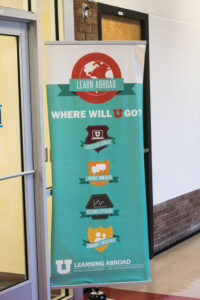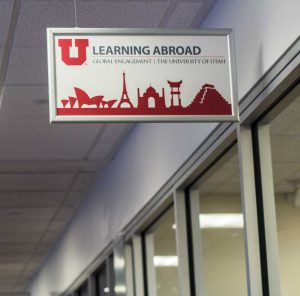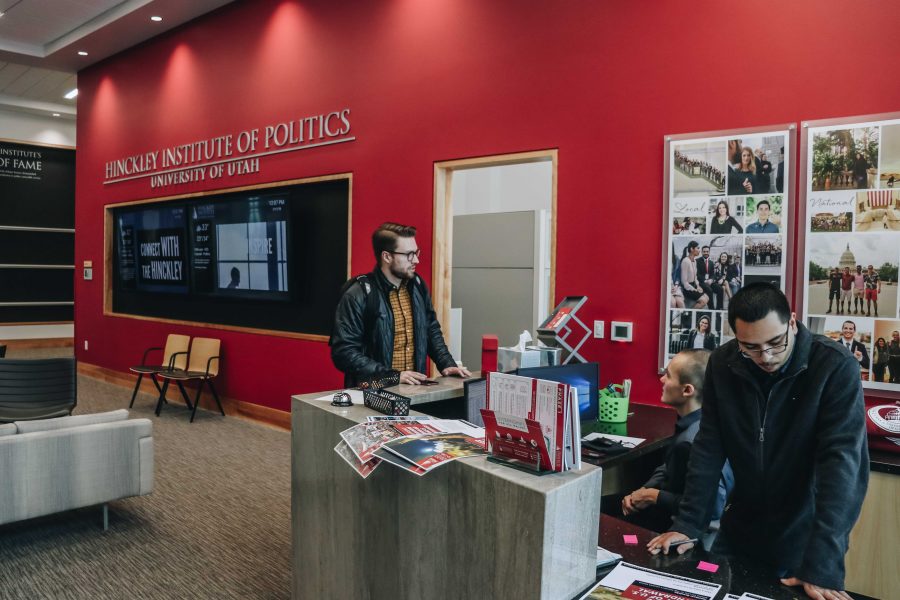The University of Utah has a diverse population of students and is well-integrated with its options for international study and internships as well as a student body and faculty made up with international citizens from all over the globe.
There are many offices at the U that are involved internationally. They each have different resources and have slightly different focuses. The U offers studies in several different departments that incorporate international ideas. The first and most obvious example is the majors offered in international and area studies in the College of Humanities. The international studies major requires an international internship or participation in a study abroad program. This may seem difficult, but with the resources on campus that span many different offices, it isn’t as unattainable as imagined.
The Office for Global Engagement is almost a one-stop shop for global programs at the U. They have information about most of the international offices on campus. Their website has a search engine that allows students to browse any activity by location, college/department, keyword and/or faculty name to find a program in a learning abroad opportunity, a U official partnership or Hinckley Institute global internship.

The Learning Abroad office is located in the Union building. They offer resources to students looking to study abroad. Their programs aren’t limited to year-long or semester-long programs — students can choose shorter and faculty-led study abroad options through this office. Learning Abroad also offers scholarships to students. On their website, there is an advanced search engine that students can use to find a learning abroad opportunity that appeals to their interests and academic requirements.
The International Student and Scholar Services, also located in the Union on the top floor, has resources for international students studying on campus. Aaron Chang, a student at the U in his first year of earning his master’s in accounting, said, “I haven’t been here long, but I feel pretty welcome here. I have been to the international student office and they answered my questions about internships as an international student.”
Their purpose is to “support the academic, research, and community service mission of the University of Utah by providing opportunities for all students, faculty and staff to incorporate an international, cross-cultural and global dimension into their academic and professional lives.” They offer resources for international students to integrate and feel welcome on campus as well as information on visas and immigration and helping with culture shock, the latter of which can be a real problem.
The Hinckley Institute, which relocated this year to the new Gardner Commons building, offers resources for students to participate in local, national or international internships. They have opportunities all over the globe for almost any major. Their mission is to “to engage students in governmental, civic, and political processes, promote a better understanding and appreciation of politics, and train ethical and visionary students for public service.” Miranda Best, Hinckley’s Outreach Coordinator and former intern said, “Throughout the numerous programs that Hinckley has to offer, students are able to learn more about themselves and their passion, develop leadership skills, and build a network that can last a lifetime.”
The U also has a campus located in South Korea. According to Study International, “all students at The University of Utah Asia Campus will receive a University of Utah degree while being taught and mentored by qualified faculty appointed at the University of Utah in South Korea.” This is a unique opportunity for some students. The requirement for a degree from the institution is three years of study in South Korea and one year at the U in Salt Lake for undergraduate students. For graduate students, one year at each location is required.

In addition to the many programs that are offered globally, the U is an international campus with international activities that are integrated into many students’ campus life. There are student-run organizations that incorporate and support international ideas such as the Eccles International Student club. There are also opportunities on campus that are specific to one country or language. Some examples of these are the Confucius Institute whose purpose is to “expand knowledge and understanding of China and its multi-faceted importance for the state of Utah,” student associations specific to one country and clubs that focus on a language like the Russian Language Table.
International associations are important for not only international students, but also American students at the U. Elena Khodakova, who came to the U as a Fulbright scholar and is now earning her master’s in world languages and culture and who teaches Russian at the U said, “People can break stereotypes when you meet people from different cultures. They provide information about their background and you realize that’s not what you thought. That’s what I try to do in the classes I teach.”
Overall, there are many international opportunities at the U for students who are or who wish to become globally engaged citizens. They are a benefit for anyone who wishes to expand their mind and interact with those who can change the way they look at the world. Khodokova said, “I haven’t traveled to many Eastern countries, for example, but when I interact with people here I get more familiarized with their culture.”
This demonstrates that even on a campus in Utah, there are ways to enrich your mind by interacting with people of different cultures and ideas.



lance johnson • Mar 24, 2019 at 11:06 am
Being an international student away from home is difficult, compounded by our complex culture and language problems. Welcoming and assimilation assistance must come from numerous sources, including the White House, to aid these young people embarking on life’s journey. Most struggle in their efforts and need guidance from schools’ international departments, immigration protection, host families, concerned neighbors and fellow students, and even informative books to extend a cultural helping hand.
Something that might help anyone coming to the US is the award-winning worldwide book/ebook by UofU grad Lance Johnson “What Foreigners Need To Know About America From A To Z: How to Understand Crazy American Culture, People, Government, Business, Language and More.” Used in foreign Fulbright student programs and endorsed worldwide by ambassadors, educators, and editors, it identifies how “foreigners” have become successful in the US, including students.
It explains how to cope with a confusing new culture and friendship process, and daunting classroom differences. It explains how US businesses operate and how to get a job (which differs from most countries), a must for those who want to work with/for an American firm here or overseas.
It also identifies the most common English grammar and speech problems foreigners have and tips for easily overcoming them, the number one stumbling block they say they have to succeeding here.
Good luck to all wherever you study or wherever you come from, because that is the TRUE spirit of the American PEOPLE, not a few in government who shout the loudest! Supporters of int’l students must shout louder.